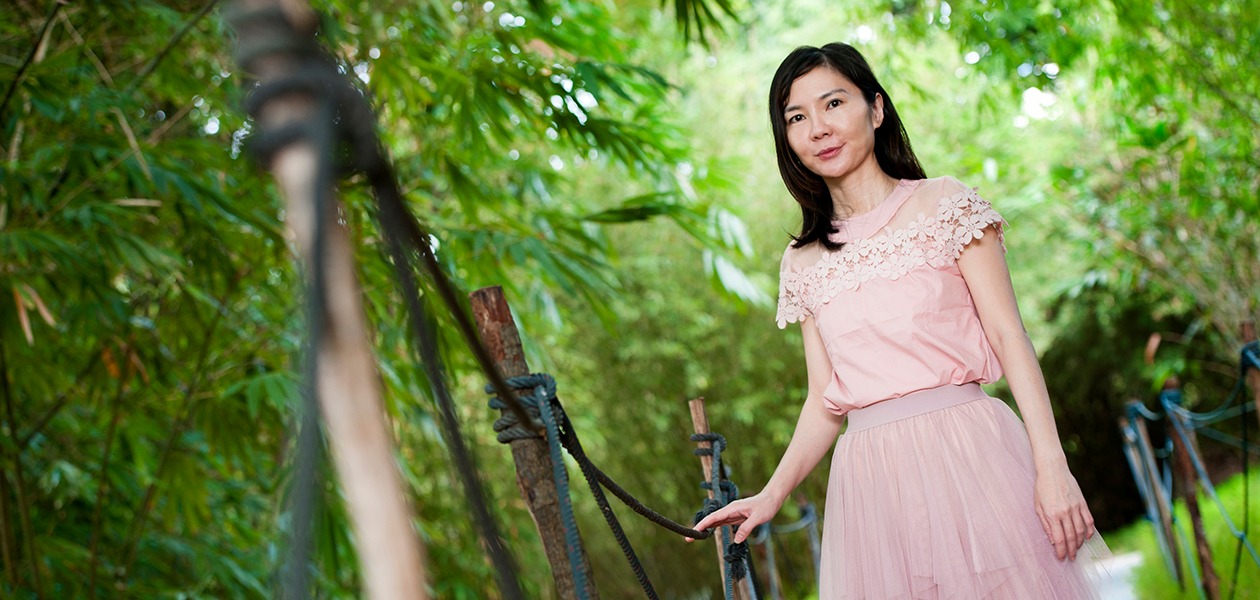The fragrant pandan leaf has long been an essential ingredient in Southeast Asian cooking, but it also has detoxification properties to nourish the body and skin. With IPI’s help, Restoration Essence teamed up with researchers to unravel some of the science behind it.
Growing up, Sara Soong would watch her mother and grandparents grind and pound plants and herbs in the kitchen. But often, these did not end up in their cooking but on their faces and bodies.
Firm believers in natural remedies, they would even make special trips to herb farms in Malaysia to pick fresh ingredients.
“My family’s all-natural approach to health and wellness made me very attuned to using herbs and plants to heal my skin and body. In fact, we hardly saw the doctor,” said Soong.
After years of enduring skin problems, such as eczema and acne, and experimenting with numerous skincare products, she grew even more certain that natural ingredients were the best for our bodies. Her goal is simple: to tap the hidden potential of everyday ingredients that are commonly found in kitchens across Southeast Asia. Her star ingredient? Pandan leaves.
In 2016, Soong co-founded Restoration Essence, a homegrown brand retailing all-natural skincare products that are free of chemicals. These products are now sold online in Singapore, Cambodia, Malaysia and Thailand.
Formulating all-natural skin remedies
According to Soong, pandan leaves have natural detoxification properties and provide pain relief, making them effective for alleviating headaches, menstrual pain and other ailments. Her grandparents would often drink boiled pandan leaf water to ease the pain of arthritis.
As previous attempts to use ingredients such as egg white and green pea paste to combat her acne showed little result, Soong decided to give pandan leaves extract a try instead. To her surprise, it cleared her skin.
“But most people only hear of pandan being used in food like pandan cake, or in taxis to ward off cockroaches. They didn’t know these fragrant leaves have potential health benefits,” Soong said. “As I wanted more people to know and benefit from this unassuming ingredient, Restoration Essence was created.”
Getting this message across was not easy. She was going up against established skincare brands and promoting a key ingredient that is uncommon in the industry. What Soong lacked in resources and brand awareness, she made up for with sheer hard work.
She would regularly visit the Malaysian farms where she sources her ingredients, to monitor their processes and plant growth more closely.
The hands-on entrepreneur would then spend days at a stretch formulating the best ingredients for each Restoration Essence product. Besides being actively involved in the product development process, Soong also intensified her network and invested in online marketing to get the word out.
Slowly, the brand’s popularity grew. In two years, her customer base nearly tripled to 600. Restoration Essence’s skincare range, which includes pandan facial scrubs, body lotions, serums and sunblock that are also suitable for kids, grew from a modest six products to more than 30 items over the same period.
Committed to producing high quality, natural skincare products, Soong continuously refines her store collection so that they are suitable for more skin types and generally, for better user experience too. Some customers, for instance, found the pandan facial too coarse for the skin.
As Restoration Essence does not have any in-house research and development capabilities, she reached out to the Institute of Materials Research & Engineering (IMRE), under the Agency for Science, Technology and Research (A*STAR).
Engaging in open innovation for greater growth
The connection with IMRE was first made through an enquiry on IPI’s Innovation Marketplace, through which she was invited to attend TechInnovation 2018, the organisation’s flagship technology brokerage event.
At that juncture, Soong was looking to improve the texture and formulation of Restoration Essence’s pandan scrub as well as to develop a pandan sunscreen.
“I appreciated the prompt follow through from my enquiry, and the receptiveness and advice provided by IPI’s technology managers in response to what I wanted to achieve for my business,” she said of IPI.
At TechInnovation 2018, IPI introduced Soong to various potential partners, including IMRE. Through A*STAR’s T-Up programme, where A*STAR scientists and research engineers are seconded to aid local small-and medium-sized enterprises in their R&D, IMRE supported the company in the performance evaluation of a new ingredient in the product. IMRE also lent its materials science expertise to improve the texture of an ingredient in the formula.
Restoration Essence, which has seen double-digit growth year on year since 2017, is looking to break into China’s online market next and eventually launch in the Middle East.
The brand has now expanded into other aspects of wellness, such as gluten-free snacks and detox teas. It currently has about 50 products with prices ranging from about $9 for pandan energy balls to about $115 for an eye serum.
Soong also conducts workshops on how to effectively care for one’s skin and body.
“Our mission is to restore our consumers’ health from within. It is not just about applying skincare products, you need to take care of the body as a whole too,” she said.

